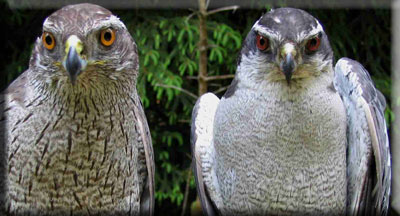Rare, Threatened and Endangered Animal Fact Sheet
Main_Content
Northern Goshawk | 
Northern Goshawk, (Accipiter gentilis)
Photograph by David Brinker | The Northern Goshawk is a large powerful secretive forest raptor, with a wingspan of up to 46 inches. It is dark gray with a finely barred light breast, has a dark head with a conspicuous white eye-line, and as an adult, red eyes. Females are about 1/3 larger than males. It is known for fierce defense of its nest, often attacking people that wander nearby. The Northern Goshawk was extirpated, or driven out of Maryland by extensive timber harvesting of Appalachian Plateau forests during the early 1900s. In the last 10 years it has slowly returned to breed in Garrett County, where it prefers the dense canopy of maturing forests. In Maryland, it prefers northern forests with conifers and builds a large bowl-like nest of sticks, lined with bark and green leaves, just below the bottom of the canopy in a tall tree.
Goshawks that are now once again breeding in Maryland do not migrate and will winter here as long as there is sufficient food to support them. In the central Appalachian Mountains their preferred prey is Red Squirrel, American Crow, Ruffed Grouse, Morning Dove, and other medium sized vertebrates, including Grey Squirrel and Cottontail Rabbit. About every 10 years, following cyclical dramatic prey population crashes in boreal forests to the north, Northern Goshawks venture into the U.S. from their main breeding areas in Canada.
The primary threat to the Northern Goshawk is a loss and degradation of habitat. In Maryland, harvesting of mature trees, forest fragmentation and development all contribute to the loss of the close canopied mature forests that support the nesting goshawks. Competition with other avian predators, such as the Great Horned Owl and Red-Tailed Hawk, which move in with fragmentation of forest habitat, is also a concern. The Northern Goshawk has returned as a rare breeder in Maryland and is listed as State Endangered.
|
|
